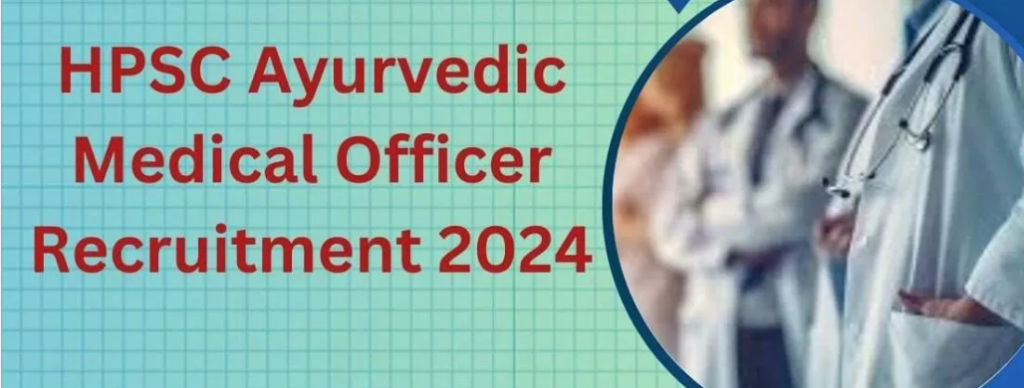Haryana Public Service Commission (HPSC) will going to conduct written examination on 805 posts of Ayurvedic medical officer (AMO) for health and Ayush department. The selection process followed for the written exam will be written test, interview and document verification. A lot of candidates has already applied for the given HPSC recruitment.
This page has all the details related to Haryana Ayurvedic medical officer syllabus 2024, its examination pattern, subjects, marks, etc which you need to prepare for this HPSC Ayurvedic Medical Officer Exam 2024.

Contents
HPSC Ayurvedic Medical Officer Syllabus 2024
1: SAMHITA SIDDHANT
- Fundamentals and Clinical Applications of Ayurveda such as Panchamahabhoota, Shatkarana (Samanya-Vishesha-Guna-Dravya-karma_samavaya), Siddhantaccording to Carakasamhita. Navakaaranadravya, Karyakarana
- Pramana-Pareeksha in the light ofclinical application and public health in Carakasamhita.
- Concepts in regards to Trisutra found in Sutrasthana of Ashtangahridayaand Carakasamhita. 4. Impact of Darshanashastra on Carakasamhita.
- Brihatrayi and Laghutrayi of Ayurveda and their Important commentaries
- Post-Independent Steps taken by Govemment through policies to develop and promote Ayurveda education, treatment and awareness.
2 & 3 : ANATOMY AND PGYSIOLOGY
4: DRAVYAGUNA
- Rasa, Guna, Veerya, Vipaka, prabhava as per Carakasamhita.
- Samana-pratyaharabdha dravya and vicitra pratyaharabdha dravya as per carakasamhita.
- Detailed knowledge on drugs mentioned in NCISM Syllabus lrom Bhavaprakasha Nighantu :md Carakasamhita.
- Brief Knowledge about pharmacology of the following – Anaesthetics, CNS depressants, Sedatives, Hypnotics, Tranquilisers, Antipyretics, Analgesics, Antiepileptics, Antihypertensive, Antianginal, Antiplatelet, Hyporipidaemic, Haemopoetic, coagulants, Bronchodialators, Aerosols/ Inhalants, Expectorants, Digestants, Carminatives, Antacids, Antiulcer, Laxatives’ Antidiarrhoeals, Antiemetic, Hepatoprotective, Diuretic, Antidiuretic, Lithotriptic, Antiinflammatory, Hormonal therapy, Antiobesity, Antidiabetic, Antithyroid, Oxytocic. Galactagogues, Contraceptives, Styptics, A_ntihistamines, Antimicrobial, -ry Antibiotics, Antimalarial, Amoebicidal, Antifilarial, Anthermentic, Antifungal.
5: SHASASHASTRA-BHAISHAJYAKALPANA
- The following topics from Rasaratnasamuccaya and Rasatarangini: Parada, Maharasa, Dhatu such as Loha, etc, Uparasa, Sadharanarasa . Sikatavarga Ksharavarga Uparatna, Sudhavarga, Visha-Upavisha.
- Different Kalpana from Sharangadharasamhita & Carakasamhita.
- Adharabhutasiddhanta of Bhaishaj yakalpana from Sharangadharasamhita & carakasamhita.
- Various formulations mentioned in NCISM syllabus found in Madhyamakhanda of Sharangdhara samhita.
- Brief knowledge of standardization ofAlurvedic formulations- Kasthaushadhi.
- Brief introduction of Drug and Cosmetics Act 1940 and Rules 1945.
- Concept of, Aushadhi Nirmanshala, with respect to Good Manufacturing practices (GMp)in accordance to Schedule T.
- Pharmacovigilance in Ayurveda.
6: ROGANIDANA:
- Nidanapancaka of diseases mentioned in carakasamhita& Madhavanidana
- Types of Immunity – different types of immune responses in the body _ Basic
- Knowledge of auto immune diseases, Acquired immune deficien”y diseu.e and hypersensitivity.
- Nomenclature and classification of tumors – difference between benign and malign.ant tumors.
- Introduction to Nutritional disorders – disorders of macro and micro nutrients.
- Introduction to common viral, bacterial and fungal infections.
7: AGADATANTRA
- Identification and Treatment of signs and symptoms due to visha-Upavisha., Animal poisoning and Mineral Poisoning according to Ayurveda and Modem perspective.
- Basics of Medical Jurisprudence in relation of clinical Practise and Hospital Administration.
- Legal Procedures:- Inquest, Evidence, Witness, Courts and their powers.
- Personal identity and its Medico legal aspects, forensic odontology, Introduction to Forensic Serology and DNA profiling.
- Death and its Medico Legal Aspects, Medico Legal autopsy and exhumation.
- Injuries and thermal injuries, their medico Legal aspects, general introduction ofweapons.
- Dowry deaths (Domestic Violence), their Medico Legal importance and laws in relation to it. 8. Asphyxial deaths and its Medico Legal importance.
- Medico Legal importance of pregnancy, Delivery; Impotence & Sterility, Abortion, 10. Infanticide, battered baby. virginity, Artificial Insemination, Legitimacy.
- Sexual offences, and their Medico Legal aspects. sexual perversions.
- Introduction to Forensic psychiatry.
- Introduction to forensic laboratory.
- Laws in relation to Medical practitioners: Indian Medicine central council Act.
- Maintenance of medical record.
- Physician’s responsibility in criminal matters, Professional negligence, Civil negligence, Criminal negligence, Medico Legal aspects of Acquired Immune Deficiency Syndrome, Rights of an unborn Medical Termination of Pregnancy Act, Transplantation of human organs Bill 1994, pre natal diagnosisTesting Act, Malingering of feigned diseases, International code of Medical Ethics for doctors, Clinical establishment Act. Consumer protection Act 1986.
8: SVASTHAVRITTA
9: PRASUTITANTRA-STREEROGA
10: KAUMARABHRITYA
11 & 12: KAYACHIKITSA AND PANCHKARMA
13 & 14: SHALYATANTRA AND SHALKAYATTANTRA
15: MEDICAL RESEARCH AND BIO STATISTICS
NOTE: For details syllabus of topic 8 to 15 please refer to official HPSC Ayurvedic medical officer exam notification 2024.
Haryana AMO Exam Pattern 2024 and Scheme of Selection
SUBJECT KNOWLEDGE TEST (SUBJECTIVE)
- Time duration of exam : 03 hours.
- The medium of exam wilt be English/Hindi.
- Total Marks: 150
- Paper will be subjective type
- No candidate will be called for the interview/ viva.voce test unless she/he secures a minimum of 35o/o marks in the test
- The number of the candidates called for interview will be three times’ alongwith bracketed candidates if any of the number of category- wise advertised posts provided that they have secured the minimum cutoff marks of 35%.
- The weightage of the test will be 87.5%
INTERVIEW
- The weightage of the interview will be 12.5%
- The final merit list will be prepared by adding the marks of Subject Knowledge Test and interview.
